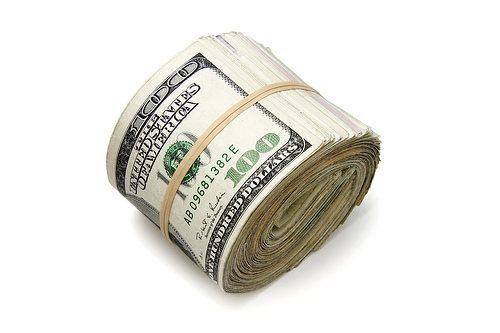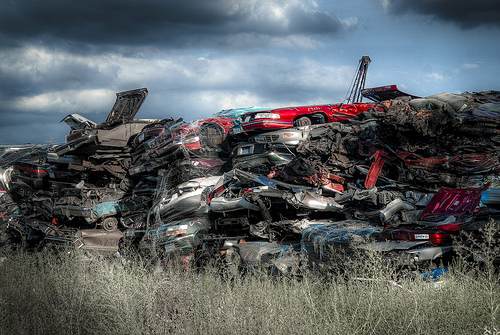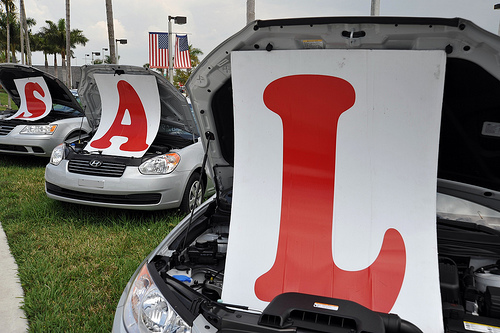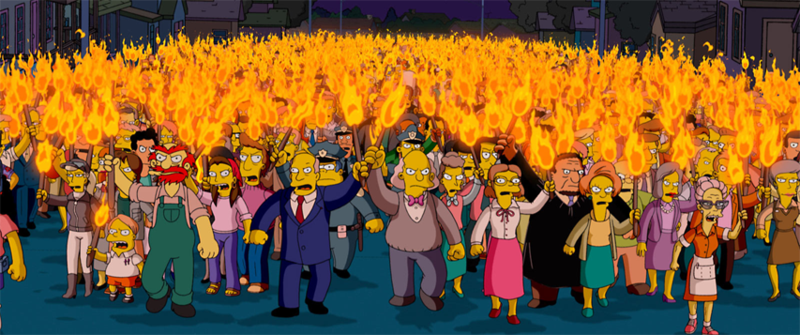Why are Used Car Prices so High?

Traditionally, buying a used car has always been a smart financial move. The depreciation on a new car fades faster than that new car smell. As soon as a shiny new car rolls off the dealer lots, a heavy chunk of money will have already have evaporated. While many sources will suggest that a car will be fully depreciated in five years, even buying a lightly used one to two year old car will usually yield significant savings from the base price. Lately however, the good deals have gone missing. Ben agrees that the market has gone bonkers as well. Fortunately for us, it’s definitely a sellers market out there. For example, in April 2010 KBB rated a 2006 Accord with 44k miles to sell for $13,825. Fast forward to today and 60k miles on the clock. KBB now lists it for $14,725. In what crazy alternate universe can you buy a car, drive it 16k miles, turn around and sell it for a $900 profit? Clearly, this is a climate where buyers have to be wary if they want to get a good deal. Read on to see why prices have gone bonkers, and how you can save some money on your next car.
Cash for Clunkers
In an effort to take older vehicles off the road and spur new car purchases and cut down on older car emissions, the federal government implemented a old car buy back program in 2009. As the name suggests, consumers would be given cash for purchasing a new vehicle if they agreed to scrap their older car. There were eligibility guidelines for vehicles to qualify, but the program became an overnight success with more than $2.8 billion reimbursed in rebates, and over 690,000 dealer transactions. While that may be a drop in bucket of the overall number of cars in the US, if you’re looking for an older model truck of SUV, some good buys may have already been sent to the crusher.
Decreased Supply
Thanks to the recession in 2008, many consumers who would have bought a new vehicle have decided to hold on to their cars a little longer. And who can blame them? With unstable finances it the horizon, it makes economic sense to keep a good running car that’s paid off rather than to go back to monthly payments. Unfortunately in 2011, it also means there are fewer cars going off of three year leases available on the used car markets. The same is true for cars that are bought and paid for. If no one wants to sell, it’s intuitive when prices are going up.
Increased Demand
As if the a drop in used car supplies weren’t bad enough, demand has also increased because of the recession. When the old jalopy finally gives out, many Americans can’t afford to go back on those pricey monthly payments for new cars. So they look for a used car. But if everyone decides they want to buy a used car at the same time, it doesn’t take long for sellers and auctions to realize they can command a higher price for the same goods.
How to Save
Ideally, it’s best not be rushed into buying anything, especially a purchase as big as a car. The longer you can wait, and the more you’re willing to walk away from a deal, the less likely you’ll make a regretful buy. That said, if you’re in a rush to buy a car in the current market, it can be really tough to find one for a reasonable price. With used car prices at record level highs, it may be one of the few times it could be worth weighing the convenience and peace of mind of buying a new car. If the list price is too high on a new model, your best bets are to look for unpopular models, or finding a new car that’s an older model and trying to cut down on inventory. As always, if you can manage to maintain your existing car and minimize the damage to your wallet, that’s probably the best bet to financially sanity. Good luck and happy hunting!




